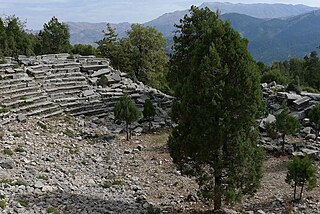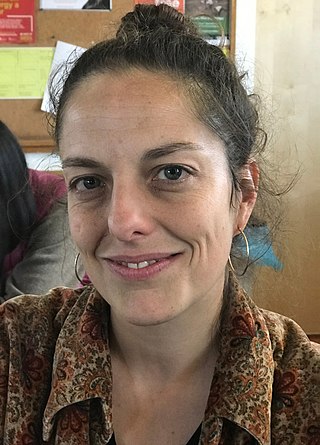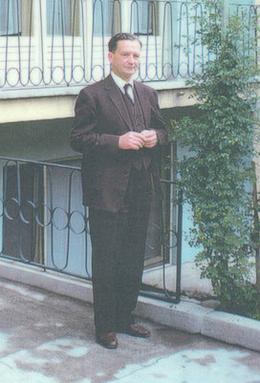
James Mellaart FBA was an English archaeologist and author who is noted for his discovery of the Neolithic settlement of Çatalhöyük in Turkey. He was expelled from Turkey when he was suspected of involvement with the antiquities black market. He was also involved in a string of controversies, including the so-called mother goddess controversy in Anatolia, which eventually led to his being banned from excavations in Turkey in the 1960s. After his death it was discovered that he had forged many of his "finds", including murals and inscriptions used to discover the Çatalhöyük site.

Mahammad Amin Akhund Haji Mulla Alekber oghlu Rasulzade was an Azerbaijani politician, journalist and the head of the Azerbaijani National Council. His expression "Bir kərə yüksələn bayraq, bir daha enməz!" became the motto of the independence movement in Azerbaijan in the early 20th century.

Ankara University is a public university in Ankara, the capital city of Turkey. It was the first higher education institution founded in Turkey after the formation of the republic in 1923.

Altındağ is a municipality and district of Ankara Province, Turkey. Its area is 123 km2, and its population is 413,994 (2022). It covers the northeastern part of the city of Ankara. Its elevation is 900 m (2,953 ft).
Ahmed Arif was a Turkish-Kurdish poet.

İlber Ortaylı is a Turkish historian and professor of history of Crimean Tatar origin at the MEF University, Galatasaray University in Istanbul and at Bilkent University in Ankara. In 2005, he was appointed as the director of the Topkapı Museum in Istanbul, until he retired in 2012.

Oenoanda or Oinoanda was a Lycian city, in the upper valley of the River Xanthus. It is noted for the philosophical inscription by the Epicurean, Diogenes of Oenoanda.

Turkish and Foreign Languages Research and Application Center of Ankara University, TÖMER, was founded in 1984 by Mehmet Hengirmen for the purposes of teaching the Turkish language to foreigners and natives; such language and culture institutions as the British Council, Goethe Institut, Instituto Cervantes and Alliance française acted as models for the constitution of the Center. It has class levels from beginner to advanced.

Institute for Armenian Research was a privately funded think tank sub-working group in Turkey established in April 2001 by the Center for Eurasian Strategic Studies. Ömer Engin Lütem was the chairman of ERAREN. In 2009, ERAREN was dissolved. It decided to carry out its activities as Center for Eurasian Studies (AVİM).

Yumuktepe is a tell at 36°48′5″N34°36′14″E within the city borders of Mersin, Turkey. In 1936, the mound was on the outskirts of Mersin, but after a rapid increase of population, the mound was surrounded by the Toroslar municipality of Mersin.
Ziya Meral is a UK based Turkish-British researcher and advisor. He specialises on global trends shaping defence and security, politics and foreign policies of Turkey and the Middle East, religion and violent conflict issues. He is a senior resident fellow at the UK Army's think-tank, the Centre for Historical Analysis and Conflict Research (CHACR) based at the Royal Military Academy Sandhurst and a senior associate fellow at the Royal United Services Institute. He was the founding director of the Centre on Religion and Global Affairs- a London, Accra and Beirut based initiative exploring impact of religions on global developments. He regularly gives talks, lectures and expert statements at leading academic, political, military and diplomatic institutions and conferences, including the UK House of Commons and House of Lords, the U.S. Congress, US State Department, NATO Defence College, EU Commission, UK FCDO and MoD and US Military Academy West Point. During 2010–2011, he was a Joseph Crapa Fellow at the US Commission on International Religious Freedom (USCIRF)- a federal body that produces policy proposals for the US government, researching on prevention of ethno-religious violence. He is the co-lead of the Climate Change and (In)Security project, a joint initiative of CHACR and Reuben College, University of Oxford. He is a Council Member of the British Institute at Ankara.
Anatolian Studies is an annual peer-reviewed academic journal covering the history, archaeology, and social sciences of Turkey and the Black Sea region. It was established in 1951 and is published by Cambridge University Press on behalf of the British Institute at Ankara.

Kilise Tepe is a mound in Mersin Province, Turkey, just west of the Göksu River, lying 20 kilometers from Mut and 145 kilometers from Mersin. It was initially known as Maltepe which is actually the name of a site on the other bank of the river about four kilometers to the west. The original name of the mound is not known and Kilise Tepe in Turkish means "church-hill" referring to a church ruin. The site is thought to have been part of the land of Tarḫuntašša, formed when Muwatalli II moved the Hittite capital.

The British Institute at Ankara (BIAA), formerly British Institute of Archaeology at Ankara, is a research institute that supports, promotes, and publishes research into the humanities and social sciences of Turkey and the Black Sea region. The institute was founded in 1947 and became legally incorporated in 1956 as part of a cultural agreement between the Republic of Turkey and the United Kingdom. The institute is a UK registered charity and part of the British Academy's Overseas Institutes. The institute has an office in based in Ankara, where it maintains a library, research facilities, and accommodation for visiting scholars. It also has a London office.

Brenna R. Hassett is an American British bioarchaeologist at University College London (UCL), author, public speaker and one of the founders of TrowelBlazers, which celebrates women archaeologists, paleontologists and geologists.

Michael Richard Edward Gough was a British archaeologist and the third Director of the British Institute of Archaeology at Ankara (1961-1968). As Director of the BIAA Gough pioneered the archaeology of early Christian sites in Turkey in anticipation of changes in academic viewpoints which were to follow in the 1990s.
Svitlana Oleksandrivna Bilyayeva is an archaeologist, who specialises in the ancient and medieval history of Ukraine, the Golden Horde and the Ottoman Empire.
David Crampton Winfield MBE was a British conservator and Byzantinist who specialised in wall paintings. The first part of his career was spent abroad, mainly in Turkey and Cyprus, and he was awarded an MBE in 1974 for his conservation work in Cyprus. In his obituary in The Times, David Winfield was described as “an investigative archaeological explorer cast in the mould of the great 19th-century scholar-travellers”.
Lutgarde Vandeput is the Director of the British Institute at Ankara.
British School of Archaeology may refer to some of the British International Research Institutes supported by the British Academy, of which now there are eight: